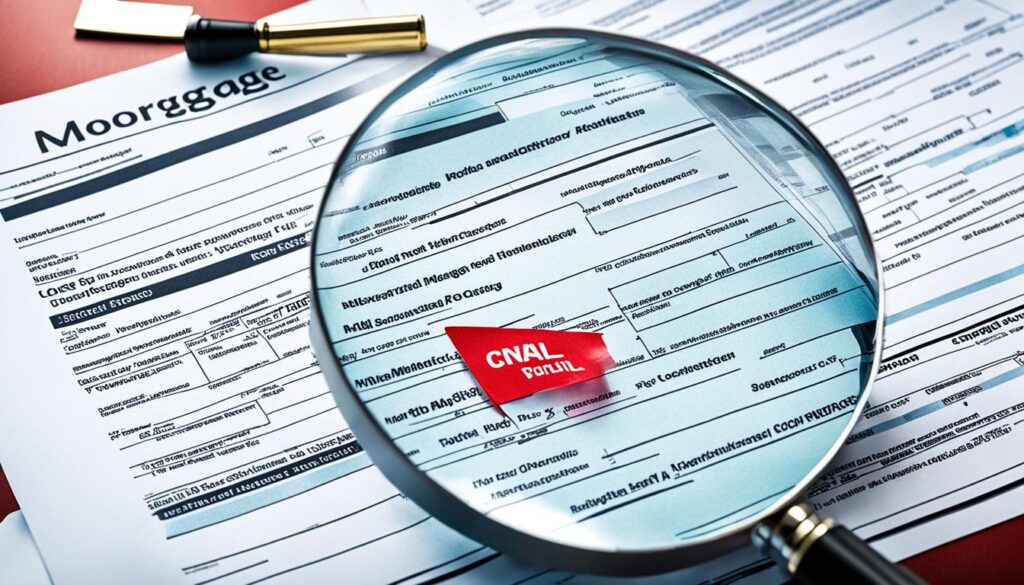Mortgage fraud is a big issue that can really hurt your wallet. It happens when people lie or leave out important stuff on their mortgage applications. This could be anything from making their income look bigger to saying their home is worth more than it is. There are two main types of this fraud. Fraud for housing means someone lies to get a mortgage, and fraud for profit is when they lie to get money from the lender or homeowner.
Scams in the mortgage business include changing loan terms without you knowing, and making a home’s value appear higher than it is. Other schemes involve stealing someone’s identity, pretending to rent out assets, taking home equity, quickly selling properties, lying about who will live in the home, and using fake buyers. To steer clear of these traps, homeowners should always be on the lookout and take steps to protect themselves:
1. Be careful with offers to change your loan and look into them deeply before you say yes.
2. Always check the claims made by people or companies you’re dealing with on your mortgage.
3. Go through your loan papers carefully to make sure you know what you’re signing up for.
4. Don’t let anyone push you into borrowing more money than you’re sure you can pay back. Stick to what you know you can handle.
By being careful and following these tips, homeowners can avoid getting caught in mortgage scams. Doing so will help keep their money safe.
Key Takeaways:
- There are two types of mortgage fraud: fraud for housing and fraud for profit.
- Watch out for tricks like changing loan terms, fake home values, and stealing identities.
- Protect yourself by always checking out claims, understanding your loan papers, and only borrowing what you can manage to pay back.
- Avoid deals that sound too good to be true, and don’t let anyone make you rush into decisions.
- If you suspect fraud, report it and get help from experts if you’re not sure what to do.
Understanding Mortgage Fraud
Mortgage fraud is when people lie or hide information on mortgage applications. They might say they earn more or that a property is worth more. This false info can lead to problems, causing losses for both lenders and homeowners. It’s important to learn the different fraud types to keep the housing market safe.
The FBI breaks down mortgage fraud into two main types: fraud for housing and fraud for profit. Fraud for housing involves lying to own a property. People might lie about their job or how much they make. Fraud for profit aims to trick lenders or make money illegally, often through schemes like flipping properties.
“Mortgage fraud is a serious criminal offense that can have far-reaching effects on individuals and the housing market as a whole.” – Federal Bureau of Investigation (FBI)
The 2008 crisis highlighted mortgage fraud, leading to more investigations and stricter rules. But, fraud keeps changing, making it crucial for everyone to stay alert. This includes people looking to buy homes or those already homeowners.
To protect yourself from mortgage fraud, understanding it is key. Learn the signs to make smart choices and avoid scams. Watch out for high appraisals, shady loan offers, and pressure to take loans you can’t afford.
Protecting Yourself from Mortgage Fraud
Staying proactive against mortgage fraud involves some steps:
- Check out lenders and mortgage brokers thoroughly before working with them.
- Read over your loan documents carefully, and ask for help to understand them fully.
- Be wary of any loan offers that seem too perfect.
- Make sure everyone involved in your mortgage is legit, like appraisers and agents.
- If you see something fishy, report it to the FBI or local police.
Following these steps can lower your chances of being a fraud victim and keep your finances safe.
Common Mortgage Fraud Schemes
Many mortgage fraud schemes exist, aiming at both borrowers and industry workers. Being aware of these can prevent you from being tricked. Here, we discuss the main types of fraud involving mortgages:
-
Loan Modification or Foreclosure Rescue Scams:
People facing financial problems are often the targets. They are offered help with modifying their loans or saving their homes for a fee upfront. Sadly, these scammers often take the money and vanish, providing no real help.
-
Inflated Property Appraisals:
Borrowers and appraisers work together to overstate the value of a property. This inflation allows for a bigger loan amount than the true value supports.
-
Identity Theft:
This fraud involves stealing someone’s identity to get a mortgage. When caught, the victim is the one left dealing with the aftermath.
-
Asset Rental Fraud:
Some borrowers fraudulently use borrowed money or assets to show they qualify for a mortgage when they do not.
-
Equity Skimming Schemes:
Scammers taking over mortgage payments from someone in financial trouble collect rent without paying the mortgage. This hurts both the original homeowner and the lender.
-
Property Flipping Scams:
Scammers falsely increase a property’s value, then sell it for a profit. Such actions can lead to severe consequences.
-
Occupancy Fraud:
Borrowers lie about their intended use of the property, which can lead to various legal and financial problems.
-
Straw Buyers:
A person buys a property in their name for someone else. This enables someone not eligible for a mortgage to get one.
Learning about these frauds can help you stay safe and knowledgeable when dealing with mortgages.

Be Cautious and Stay Informed
“Knowledge is power. By understanding the common schemes used in mortgage fraud, you can stay ahead of scammers and protect yourself from financial harm.”
How To Avoid Loan Modification Scams
Loan modification scams target those in financial trouble or at risk of losing their homes. Scammers trick people into thinking they can change loan terms for less stress. To avoid these schemes, stay alert and learn how to spot them.
Remember, only your mortgage provider can adjust your loan legally. If someone else offers this, it’s likely a scam. Also, most places prohibit fees before modifying a mortgage. No third party can guarantee a better outcome or make your application stronger.
Always check if those offering help are really linked to the government. And don’t just believe any promise they make. It’s smart to doubt anyone who tells you to stop paying your mortgage without involving your real servicer.
Here’s how you can shield yourself from these scams:
- Ask friends and family for advice on who to trust.
- Confirm the value of your property to prevent misinformation.
- Get a real estate lawyer when dealing with complex agreements.
- Read every last detail in your loan documents.
By taking these steps, you can lower your risk of being tricked and keep your finances safe.

“Avoid Loan Modification Scams by being cautious of quick help promises and checking what third parties claim.” – Mortgage Fraud Expert
| Warning Signs of Loan Modification Scams | Protective Measures |
|---|---|
|
|
Staying safe from loan scams means being careful, questioning things, and doing thorough research. Being well-informed and taking the right steps will help you handle your mortgage safely.
How To Spot Mortgage Scams
Spotting mortgage scams is tricky, but knowing the signs can save you from trouble. Keep an eye out for these warnings:
1. Unrealistic promises and “too good to be true” interest rates
Scammers tempt with offers that sound amazing. Be careful if a lender offers super low rates or says they’ll approve any loan, no matter your credit.
2. Non-honored Loan Estimate and excessive loan costs
If the loan’s estimated costs change or you find unexpected fees, it could be a scam sign. Such surprises could mean you’re not getting the full picture up front.
3. Mortgage payments exceeding 28% of monthly income
Watch out if a loan would make you spend more than 28% of your income on your house. Scammers might try to sell you a loan that’s too much for you to handle.
4. Overvalued properties and penalties for prepayment
High property prices or big penalties for paying early are bad signs. They might mean scammers are trying to grab more money from you.
5. Bait-and-switch tactics and disregard for credit score
Changes in promised loan terms or downplaying credit scores are tricks to look out for. They could signal the lender isn’t being honest.
Being alert to these danger signals can help you steer clear of mortgage scams.

| Signs of Mortgage Scams | Description |
|---|---|
| “Too good to be true” interest rates | Watch out for rates that seem too low to believe. They could be a sign of something fishy. |
| Non-honored Loan Estimate and excessive loan costs | If the costs don’t match the original estimate, or if you find surprise fees, be cautious. It could hint at shady practices. |
| Mortgage payments exceeding recommended limits | Landing you in loans you can’t really handle is a scam tactic to watch out for. |
| Overvalued properties and prepayment penalties | Stiff penalties for paying early or prices that seem way too high are red flags. They often point to attempts to cheat you. |
| Bait-and-switch tactics and disregard for credit score | Be wary of lenders that suddenly change the deal or act like your credit score isn’t important. They might be trying to pull a fast one on you. |
Stay sharp and learn to recognize these scam signs. It can protect you from dishonest mortgage deals.
Types Of Mortgage Scams To Watch Out For
Borrowers need to be careful because there are many mortgage scams. It’s important to know the different kinds to protect yourself from fake deals.
Mortgage Wire Fraud
Scammers pretend to be people in the mortgage process. They trick borrowers into sending money to fake accounts. This leads to big money loss for people.
Foreclosure Scams
Homeowners in tough spots are targets of foreclosure scams. These include equity skimming and phony loan helps. Scammers use people’s hard times to their advantage.
Reverse Mortgage Scams
Older people with HECM loans are often the victims of these scams. Scammers give false home appraisals. This ends up making senior’s equity disappear.
Bait-and-Switch Scams
Scams lure borrowers in with great loan terms. But, they later change these or say the borrower doesn’t qualify. This puts people in bad financial places.
Loan Flipping or Churning
Lenders keep refinancing loans to make more fees. This keeps people in a never-ending loop of debt. It’s a dishonest cycle of financial harm.
Fake Real Estate Agents
Some scammers act like real estate agents. They sell properties that aren’t real or are completely wrong. Then, they take the commission without doing real work.
Knowing about these scams helps borrowers stay on guard. It’s key to protecting against fraud in the mortgage world.

Watch for the signs of mortgage scams. Knowing what to look out for gives you the power to make the right choices for your mortgage.
How To Protect Yourself From Mortgage Scams
Protecting yourself from mortgage scams is key for your financial health. Follow these steps to lower the chance of being scammed.
- Start by researching and comparing mortgage lenders. Find ones with good track records and happy customers.
- Stay away from loan offers that come without you asking. Be careful with anyone who contacts you first.
- Keep your personal and bank info safe. Only share it with well-known and trusted companies.
- Always read loan documents very carefully. Make sure you understand everything before signing. Get legal help if you’re unsure about anything.
- It could be helpful to work with credit counselors, lawyers, or finance experts. They can guide you and spot scams.
- Don’t deal with people who try to rush you or use forceful tactics. Legitimate lenders will be open and respectful.
- Check the credentials of everyone involved in your mortgage. Make sure they’re licensed and qualified.
By using these tips during your mortgage process, you’ll be less likely to get scammed. Remember, being cautious is your best protection against fraud.
What To Do If You Think You’ve Been Scammed
If you feel you’re a victim of mortgage fraud, quick action is key. Follow these steps:
- Contact your mortgage servicer or lender first. Let them know what’s happening. They can help you figure out what to do next.
- Report the fraud to the right places. Contact the FBI, U.S. Attorney’s Office, and the FTC. Also, reach out to the CFPB and local authorities to make a report.
- Talk to a HUD-certified counselor. They can offer advice and look at your options. They may help you find solutions or ways to fix things.
Acting fast against mortgage fraud is crucial. When you suspect fraud, report it quickly to start on your recovery.
Here are some important points to remember if you’ve been scammed:
1. Contact your mortgage servicer or lender
2. Report the fraud to the authorities
3. Seek guidance from a HUD-certified counselor
By taking these actions, you shield yourself. Plus, you play a part in stopping scams, making mortgages safer for everyone.
Conclusion
Mortgage fraud is a big issue that can hit hard financially. It’s key for homebuyers to know the signs and common tricks. By learning about these, they can lower the chance of getting scammed.
One important step is doing your homework and checking everything before signing. Look closely at the loan papers. Be wary of promises that sound too good to be true. And don’t be afraid to ask experts for advice.
It’s also vital to keep an eye out and report any fraud suspicions. This helps fight against scams. And it keeps the mortgage system safe for everyone.
FAQ
How can I avoid mortgage scams?
To avoid mortgage scams, homeowners need to be cautious. They should watch out for loan modification scams. It’s important to do your own research and check loan papers carefully. Don’t let anyone pressure you into taking a loan bigger than you can pay back.
What is mortgage fraud?
Mortgage fraud happens when people lie or hide important facts on their loan applications. They do this to trick lenders or homebuyers.
What are some common mortgage fraud schemes?
Common frauds include changing loans dishonestly, making properties seem worth more than they are, and stealing someone’s identity. Other schemes involve renting out assets, using someone else to buy a property, and flipping properties quickly. Fraudsters may also lie about who will live in a home or who’s really buying it.
How can I avoid loan modification scams?
Avoiding scams means being informed. Know that your mortgage servicer alone can change your loan legally. It’s also key to understand that upfront fees for loan changes are mostly against the law. Always check any “guarantees” yourself, especially if they’re government-related or include money-back offers. And never stop your payments without talking to your servicer first.
What are some signs to watch out for to spot mortgage scams?
Look out for several red flags: super low interest rates, loan costs that seem too high, loans that take more than 28% of your income, and too good to be true property values. Watch for charges for paying back your loan early, claims that your credit score doesn’t count, and tricky switching of loan terms.
What are some types of mortgage scams to watch out for?
Be wary of scams like wire fraud, tricking you out of your home through “foreclosure rescue,” and dishonest reverse mortgages. Others include promises that change after you sign, loans that just shuffle the debt around, and fraudsters pretending to be real estate agents.
How can I protect myself from mortgage scams?
Protecting yourself starts with smart shopping and asking questions. Be careful with any unsolicited offers. Keep your critical information safe. Understand all loan details fully. Getting advice from trusted credit professionals is wise. Never work with pushy or bully-like lenders. Always double-check the credentials of anyone involved in your home loan.
What should I do if I think I’ve been scammed during the mortgage process?
If you think you’ve been scammed, the first step is to contact your loan servicer or lender. Report the suspected fraud to the FBI, your state attorney’s office, and other relevant agencies. Seek advice from a HUD-certified counselor for help figuring out your next steps.


















